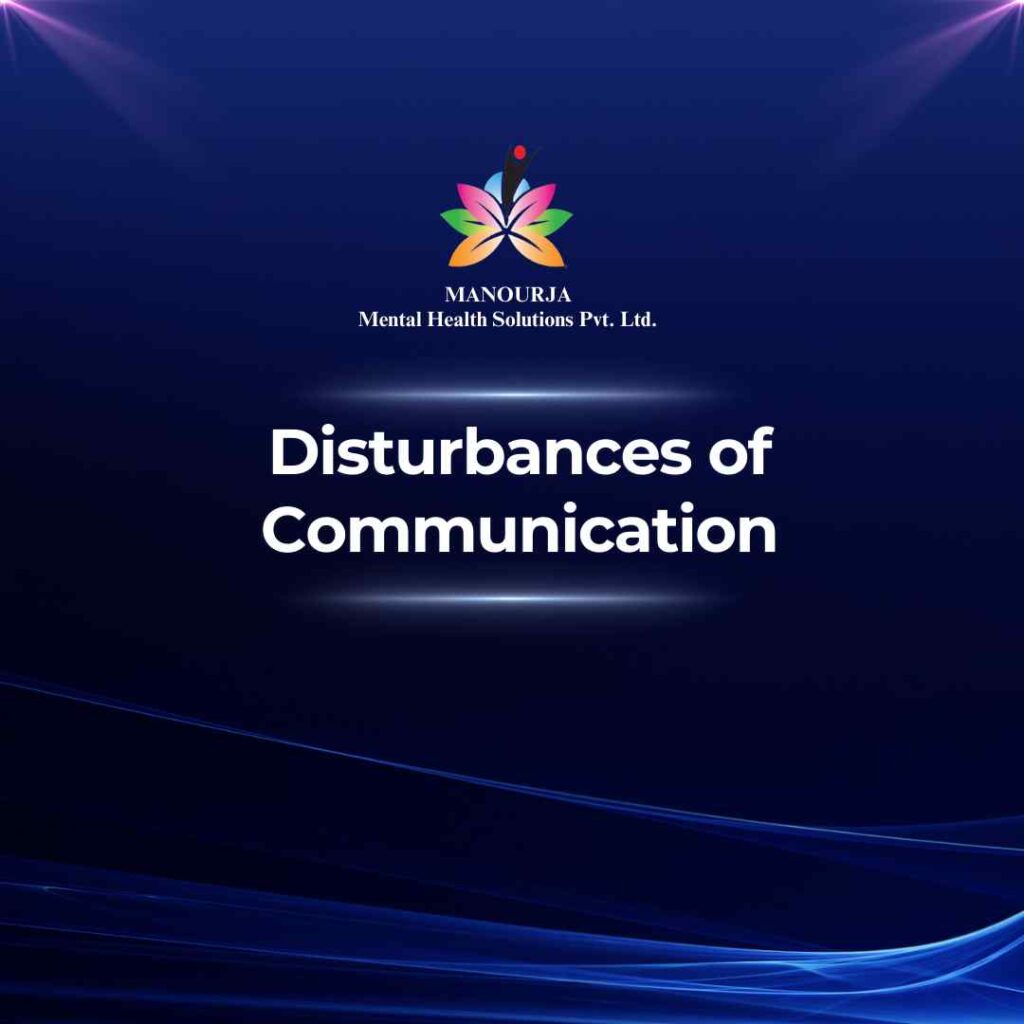Disturbances of Communication

Disturbances of communication refer to abnormalities in the ability to convey or understand messages effectively. These disturbances can affect verbal and non-verbal communication, leading to significant challenges in social interactions, relationships, and daily functioning. Communication disturbances can manifest as difficulties in speaking, understanding language, using appropriate social cues, and maintaining coherent discourse.
Disturbances of Communication as a Sign and Symptom of Mental Illness
Disturbances of communication can manifest in various forms, including:
- Aphasia: Difficulty in producing or understanding spoken or written language.
- Dysarthria: Motor speech disorder resulting in unclear articulation.
- Echolalia: Repetition of another person’s spoken words.
- Mutism: Inability or refusal to speak.
- Tangentiality: Diverging from the topic of conversation, leading to irrelevant speech.
- Clang Associations: Choosing words based on their sound rather than meaning, often resulting in rhyming or punning.
- Neologisms: Creating new, nonsensical words or phrases.
- Pressured Speech: Rapid and excessive speech that is difficult to interrupt.
- Incoherence (Word Salad): Severely disorganized speech that is nearly impossible to understand.
- Pragmatic Language Impairments: Difficulty using language appropriately in social contexts.
Mental Illnesses Where These Disturbances Are Present
Schizophrenia is characterized by severe disturbances in communication, including incoherence, neologisms, echolalia, and tangentiality. These symptoms reflect disorganized thinking and impaired reality testing.
Individuals with ASD often exhibit significant communication disturbances, including difficulties with pragmatic language, echolalia, and challenges in understanding and using non-verbal communication cues.
- Aphasia (resulting from stroke or brain injury)
Aphasia is a condition often resulting from stroke or brain injury that affects the ability to produce or understand language. It can lead to communication disturbances such as word-finding difficulties, reduced fluency, and impaired comprehension.
During manic episodes in Bipolar Disorder, individuals may exhibit pressured speech and flight of ideas, leading to rapid and incoherent communication. During depressive episodes, communication may be minimal or slow due to cognitive slowing.
In Major Depressive Disorder, particularly in severe cases, individuals may exhibit mutism or reduced speech output, as well as difficulties in organizing thoughts coherently due to pervasive sadness and cognitive impairments.
Dementia, including Alzheimer’s disease, often involves progressive communication disturbances. Individuals may struggle with word-finding, coherence, and following conversations as cognitive functions decline.
- Tourette Syndrome
Tourette Syndrome can involve echolalia and palilalia (repetition of one’s own words) as part of the complex tics associated with the disorder.
- Social (Pragmatic) Communication Disorder
This disorder, often diagnosed in childhood, involves difficulties in the social use of verbal and non-verbal communication, such as challenges in following conversational rules and understanding implicit cues.
Individuals with OCD may exhibit circumstantiality in their communication, providing excessive and unnecessary detail due to intrusive thoughts and compulsions.
Delirium is an acute and often reversible condition that can cause severe disorganization of thought and speech, leading to incoherence and difficulty following conversations.
Conclusion
Disturbances of communication are significant indicators of various mental health disorders. Recognizing these disturbances is crucial for accurate diagnosis and effective treatment, helping individuals manage their symptoms and improve their communication skills and social functioning.
At MANOURJA, we believe in the transformative power of counseling. Our experienced therapists offer a safe and supportive space where you can explore your thoughts, emotions, and challenges. Through personalized counselling sessions, we’ll work together to develop coping strategies, build resilience, and achieve lasting positive change. Discover the path to a healthier, happier you with MANOURJA counselling services.
MANOURJA Rehabilitation Services
At MANOURJA, we’re dedicated to helping you in rebuild your life, after difficult times. Our rehabilitation services focus on understanding what you need to move forward, whether you’re recovering from addiction, trauma, or any psychological – social challenges. We create personalized plans, that are all about helping you, regain your strength and find hope again. With a caring team by your side, you’ll have the support to make real progress and take steps toward a brighter, healthier future.
